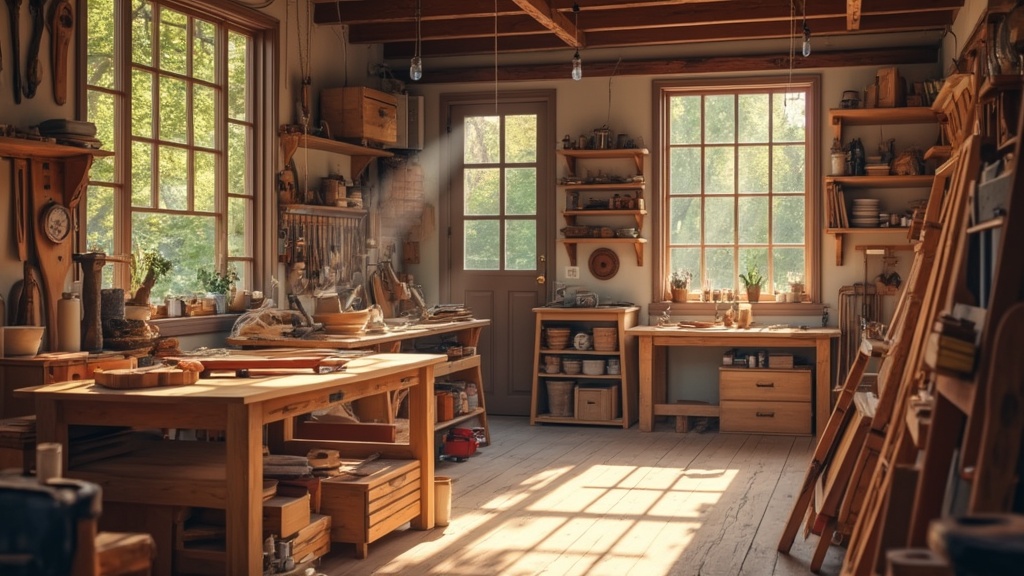Handmade furniture suppliers are transforming home decor by providing distinctive designs that differentiate themselves from mass-produced options. This shift has sparked an increased demand for personalized options, mirroring a broader trend towards individuality and sustainability in residential spaces.
Collaborations with local artisans guarantee that each piece embodies a narrative, showcasing exceptional craftsmanship.
The rise of custom wood furniture illustrates a shift in consumer preferences, emphasizing durability and ethical sourcing rather than factory-produced alternatives.
Each commission not only supports small businesses but also delivers quality furnishings that resonate with contemporary aesthetics and values.
Click here to learn more about: accent furniture
Artisanal Techniques In Handmade Furniture
The craftsmanship observed in handmade furniture is a testament to the artisanal techniques employed. Notable methods, such as hand-carving and dovetail joints, significantly enhance the durability and aesthetic value of these products.
This growing appreciation for traditional styles signals a consumer trend favoring craftsmanship over mass production. A visit to local workshops often reveals the intricate processes behind each piece, fostering a deeper understanding of the artistry involved.
Witnessing Craftsmanship Firsthand
Experiencing artisanal techniques in action, especially through design consultations, allows enthusiasts to connect with the processes and materials used.
Observing artisans at work provides insights into their unique skills, showcasing how bespoke creations come to life.
This hands-on experience not only cultivates appreciation for the art form but encourages sustainable practices that benefit the artisan community.
Preserving Craftsmanship Heritage
Artisanal practices are more than mere techniques; they also serve as a means of preserving a rich craftsmanship heritage.
By favoring locally-sourced materials, artisans promote sustainable materials while enhancing the uniqueness of every piece. Support for local economies fosters a cycle of growth for small businesses, ensuring that each handcrafted item reflects ethical sourcing and individualized design.

How To Identify Quality Craftsmanship
Recognizing quality craftsmanship begins with a thorough examination of the materials utilized in furniture making. Quality materials play a significant role in ensuring durability, while fine craftsmanship is characterized by key indicators like joinery and finish quality.
When shopping for furniture, it is essential to assess the following aspects:.
- Inspect the joinery: Look for tight, clean joints that indicate strength and craftsmanship.
- Check the finish: Ensure it is smooth and even, showcasing an artistry that reflects attention to detail.
- Evaluate the materials: Research the types and sources of materials for their sustainability and ethical sourcing.
- Assess functionality: Ensure drawers and doors open smoothly and fit well, indicating fine craftsmanship.
Each of these factors directly impacts your choice, linking craftsmanship to overall aesthetic value and longevity.
Bespoke Creations For Unique Spaces
The increasing demand for personalized home environments underscores the appeal of bespoke creations. Custom design facilitates unique pieces that maximize space utility while accurately reflecting individual tastes. Homeowners can achieve tailored solutions by collaborating with designers to create multifunctional pieces that fit specific dimensions and needs.
Personalization Options
Custom wood furniture enables unique expressions of style, allowing individuals to curate their living spaces with distinctive aesthetics.
Enhanced Aesthetics
Custom creations elevate a space’s overall look and harmony. By clearly communicating your vision and embracing innovative design ideas, homeowners can leverage the artistry of local artisans to enhance their homes.
Quality Craftsmanship and Bespoke Creations
- High-quality joinery can significantly extend the lifespan of furniture, reducing the need for replacements.
- Custom furniture can increase a home’s resale value by appealing to buyers looking for unique and personalized spaces.
- Using sustainable materials in custom designs supports environmental conservation and ethical practices.
- Collaborating with local artisans fosters community engagement and supports small businesses.
Sustainable Materials In Furniture Making
The rise of eco-conscious consumerism in home decor has led to the increased use of environmentally friendly materials, including reclaimed wood and bamboo. These sustainable materials not only minimize environmental impact but also enhance the aesthetic value of furniture.
For instance, reclaimed wood reduces waste and adds a unique character to each piece, making it a popular choice for home furnishings.
Key Sustainable Materials
Common sustainable materials found in furniture making include:.
- Reclaimed Wood: This material is sourced from previously used wood, promoting furniture restoration and reducing the demand for new timber.
- Bamboo: Known for its rapid growth, bamboo is an eco-friendly alternative that offers durability in modern designs.
- Recycled Metal: Utilizing metal from old furniture or construction reduces waste while maintaining strength in designs.
When searching for sustainable furnishings, look for certifications such as FSC-certified wood, which ensures responsible forest management. Exploring local suppliers committed to ethical sourcing supports both sustainability and fine craftsmanship. Prioritizing options that showcase durable products and timeless designs resonates with eco-conscious living.
Why Choose Local Artisans For Your Home
Supporting local artisans offers an exceptional opportunity to acquire unique pieces that enrich your home with custom design and artistry. Purchasing from small businesses enhances the local economy while highlighting the individual stories and artisanal techniques behind each piece.
Benefits of Supporting Local Artisans
- Economic Support: Buying locally strengthens the community by keeping finances within the local economy.
- Unique Craftsmanship: Local artisans often create bespoke pieces that reflect cultural heritage and personal artistry.
- Sustainable Practices: Many local craftsmen utilize sustainable materials, ensuring that their production methods are environmentally friendly.
By exploring local markets and craft fairs, you can discover one-of-a-kind pieces that not only enhance your space but also establish a personal connection with the craftsperson. Supporting these artisans ensures that their artistry continues to thrive within your community and contributes to the preservation of craftsmanship heritage.
Sustainable Furniture and Local Artisans
- Reclaimed wood can reduce landfill waste by up to 30%, promoting sustainability in furniture production.
- Bamboo can grow up to 35 inches in a single day, making it one of the fastest-growing plants on Earth.
- Purchasing from local artisans can reduce carbon footprints associated with shipping and transportation.
- Supporting local businesses can lead to a 5 times greater impact on the local economy compared to shopping at large chain stores.
Custom Design Options For Personalized Pieces
The growing desire for individuality in home design is driving consumers to explore custom design options that truly reflect their tastes. Homeowners now prioritize unique pieces that resonate with their personal identity and style.
Technology plays a significant role, as tools such as 3D modeling and virtual reality allow consumers to visualize their designs before making a purchase.
Custom design options are broad, ranging from materials like reclaimed wood to modular designs that cater to specific spatial needs.
Finish and color selections enhance the aesthetic value of furniture, ensuring that each piece is as distinctive as its owner.
Customization Examples
- Materials: Choices include sustainable materials, such as reclaimed wood and ecofriendly finishes.
- Design Flexibility: Modular pieces offer tailored solutions for varying spatial configurations.
- Color Options: Palette selections allow homeowners to express their unique aesthetic preferences.
- Customer Commission: Clients can work directly with artisans for bespoke creations that fulfill specific desires.
Reviews Of Top Handmade Furniture Suppliers
Making informed purchasing decisions stands as a priority when selecting handmade furniture suppliers. Consumers should assess multiple aspects beyond mere aesthetics. Evaluating craftsmanship and sustainability practices of a supplier highlights their commitment to quality.
Criteria for Evaluation
- Customer Testimonials: Reading reviews can provide insights into a supplier’s reliability and product durability.
- Return Policies: Understanding return and exchange terms is essential for safeguarding against potential disappointments.
- Craftsmanship Certification: Look for certifications that showcase the supplier’s commitment to fine craftsmanship.
- Customer Service: Excellent service enhances the overall purchasing experience, instilling confidence in buyers regarding their unique pieces.
Ultimately, supporting small businesses and local artisans enriches the artisan community and promotes a sustainable approach to home furnishings.
Custom Design Options
- Over 70% of homeowners express a desire for personalized home decor that reflects their individuality.
- Studies show that using technology like 3D modeling can enhance customer satisfaction by 30% when visualizing custom designs.
- Eco-friendly materials are increasingly popular, with a reported 50% rise in demand for sustainable furniture options in recent years.
- Custom pieces can increase the perceived value of a home, with unique furnishings contributing to a 20% higher resale value.
The Importance Of Craftsmanship Certification
Craftsmanship certification plays a significant role in fostering consumer confidence and assurance in quality. When buyers understand the value of certification, they are more likely to trust that the products they are purchasing, particularly handmade goods, adhere to high standards of quality and durability.
Such certifications often indicate a commitment to delivering exceptional and lasting products.
Items that carry reputable craftsmanship certifications are known to retain higher resale values, especially in the realm of custom wood furniture.
This characteristic not only enhances the appeal of such products as investments but also reflects a growing awareness among consumers regarding the importance of quality in their purchases.
To ensure the authenticity of your choices, it is essential to verify certifications from recognized industry bodies. Exploring artisans’ backgrounds can also provide valuable insights into their unique craftsmanship techniques and the materials utilized, ensuring that the products you select are not only aesthetically pleasing but also sustainable.
Verifying Craftsmanship Credentials
When considering a purchase from local artisans, verifying craftsmanship credentials is crucial for making informed decisions.
Begin by examining the documentation that accompanies the product, as many artisans provide proof of certification. This step can offer assurance that the item aligns with your standards for quality and ethical sourcing.
“One of the best ways to gauge excellence in craftsmanship is through a commitment to transparency. ”
Seek out reviews and testimonials from previous customers.
Often, these firsthand accounts can shed light on the artisanal techniques and attention to detail employed by the artist.
By connecting with the artisan community and supporting small businesses, you not only acquire unique pieces but also contribute to a thriving local economy.
Craftsmanship Certification
- Craftsmanship certification enhances consumer trust by ensuring products meet high standards of quality and durability.
- Items with reputable certifications often retain higher resale values, particularly in the custom wood furniture market.
- Verifying craftsmanship credentials through documentation and reviews helps consumers make informed purchasing decisions.
- Supporting local artisans contributes to the local economy while providing unique and sustainable products.


